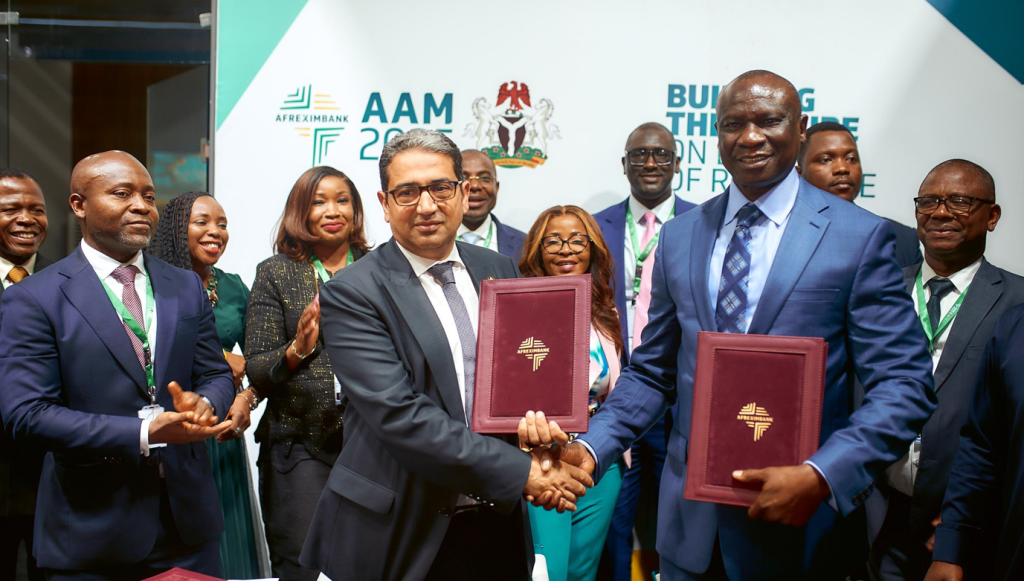Gambiaj.com – (ABUJA, Nigeria) – The Gambia has secured a major financing breakthrough following the signing of a US $75 million five-year cross-currency swap agreement between the African Export-Import Bank (Afreximbank) and the Central Bank of The Gambia (CBG), a deal that is poised to reshape the country’s transport infrastructure and catalyze inclusive economic development.
Signed during the 32nd Afreximbank Annual Meetings (AAM2025) held in Abuja, Nigeria, the agreement will enable Afreximbank to inject critical liquidity into The Gambia’s economy by purchasing bonds issued by the National Roads Authority (NRA).
These bonds will serve as the swap securities for the transaction, providing long-term funding to support strategic road projects across the country.
This financing arrangement marks a significant departure from conventional sovereign loans and grants, leveraging innovative financial instruments to address infrastructure bottlenecks—long recognized as one of the most binding constraints on The Gambia’s development.
A Strategic Response to Economic Constraints
Commenting on the deal, Afreximbank’s Executive Vice President, Mr. Haytham Elmaayergi, underscored the institution’s role in unlocking trade-enabling infrastructure.
“This transaction reflects Afreximbank’s commitment to helping member countries overcome liquidity challenges and develop essential infrastructure to drive trade,” he said.
According to Elmaayergi, the cross-currency swap will support the construction and rehabilitation of both rural and urban road networks—an essential pillar of the government’s strategy to stimulate economic activity, ease the movement of goods and people, and deepen regional trade integration.
With The Gambia’s economy heavily reliant on agriculture, trade, and tourism, improved road infrastructure is expected to reduce transport costs, increase agricultural output, and foster industrial activity.
The timing of this agreement is critical, coming as the government, under President Adama Barrow, intensifies efforts to close the infrastructure gap and expand economic opportunities nationwide.
A New Model for Financing Development in a Broader Regional Context
Governor of the Central Bank, Mr. Buah Saidy, described the deal as a pragmatic tool to relax the “binding constraint of a challenging transport network,” adding that the facility will directly support President Barrow’s directive to expand road infrastructure across the country.
“This swap will allow the NRA to build roads that open up the economy by connecting rural production areas with urban markets,” Saidy stated, framing the agreement not just as a financial deal, but as a strategic intervention to unlock long-term economic growth.
The move also highlights a broader shift in Africa’s approach to development financing—away from donor dependency and toward innovative, market-based mechanisms that mobilize domestic capital and regional institutions like Afreximbank.
Oakwood Green Africa, which acted as transaction advisor to both CBG and NRA, played a pivotal role in structuring the deal and facilitating the swap, showcasing the importance of homegrown financial expertise in navigating complex financing landscapes.
The deal was signed on the sidelines of the AAM2025, an event that drew over 7,000 participants from across Africa and the Caribbean, including heads of state, ministers, and business leaders. The meeting also marked a leadership transition at Afreximbank, with Dr. George Elombi announced as incoming president, succeeding Prof. Benedict Oramah after a decade at the helm.
The Gambia’s active participation in the bank’s governance—it is a founding shareholder—gives it unique access to Afreximbank’s suite of financial instruments, which it is now utilizing to accelerate infrastructure development and economic transformation.
As countries across Africa scramble to close infrastructure gaps estimated to cost the continent over US $100 billion annually, The Gambia’s currency swap deal may serve as a model for others seeking to unlock capital through bond-backed facilities tied to local development goals.
By turning to Afreximbank and utilizing a sophisticated cross-currency swap backed by domestic bonds, The Gambia is signaling a more confident, self-directed approach to development.
If well implemented, the partnership could be a catalyst for transformative growth—improving connectivity, boosting productivity, and opening a new chapter in the country’s journey toward inclusive and sustainable development.










